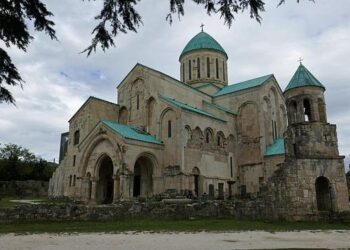In recent decades, the Republic of Georgia has witnessed a complex interplay between intellectual resistance and state repression, echoing historical patterns that continue to shape its political and cultural landscape. As the country navigates the challenges of democratization and regional tensions, the persistent struggle of writers, academics, and activists against authoritative measures highlights a recurring narrative where history seemingly repeats itself. This article explores the cyclical nature of dissent and control in Georgia, drawing parallels between past and present to shed light on the ongoing battle for freedom of expression in the New Eastern Europe.
Intellectual Resistance in Georgia A Legacy of Defiance Against Authoritarianism
Throughout Georgia’s modern history, the landscape of intellectual resistance has been shaped by individuals and collectives who dared to challenge prevailing authoritarian regimes. From the early 20th century Soviet era to more recent political crackdowns, Georgian intellectuals have employed a variety of methods to resist oppression. These range from clandestine literary circles and underground publications to public demonstrations and academic critiques. The resilience of these figures is evident in their commitment to maintaining a space for free thought, even under the shadow of censorship and state intimidation.
Key tactics of intellectual defiance have often included:
- Samizdat Literature – Self-published manuscripts that circumvented official propaganda channels.
- Philosophical Discourse – Utilizing cultural debates to question and undermine authoritarian narratives.
- Public Lectures and Forums – Platforms where dissidents educated and mobilized citizens despite surveillance.
- Artistic Expression – Using poetry, theater, and visual arts as coded mediums of critique.
| Period | Notable Intellectual Acts | State Response |
|---|---|---|
| 1920s-1930s | Secret literary salons, nationalist poetry | Arrests, exile, book bans |
| 1970s-1980s | Samizdat journals, dissident manifestos | Surveillance, censorship, imprisonment |
| 2000s-present | Online forums, public intellectual debates | Internet restrictions, defamation campaigns |
State Repression Tactics Unveiling Patterns and Consequences in Georgian Political History
Throughout Georgia’s turbulent political landscape, various state repression tactics have consistently emerged as tools to suppress dissent and intellectual opposition. From covert surveillance networks in the Soviet era to overt crackdowns on independent media in recent decades, these methods reveal a persistent pattern: the deliberate stifling of voices that challenge prevailing power structures. Tactics such as arbitrary arrests, censorship, forced exile, and intimidation campaigns have targeted not only political figures but also academics, journalists, and activists who dare to advocate for democratic reforms or cultural autonomy. The state’s calculated approach often blends legal pretexts with extralegal actions, creating an atmosphere of fear while maintaining a veneer of legitimacy.
The consequences of these tactics resonate far beyond immediate political suppression. They foster cycles of mistrust between the government and civil society, impeding political pluralism and weakening democratic institutions. Intellectual resistance, however, has shown remarkable resilience, adapting through underground networks, émigré platforms, and digital activism. This dynamic interplay is summarized below:
| Tactic | Primary Target | Consequence |
|---|---|---|
| Surveillance and Informants | Academics, Journalists | Self-censorship, Distrust |
| Media Censorship | Independent Press | Information Blackouts |
| Arbitrary Detentions | Political Activists | Human Rights Violations |
| Exile and Emigration | Opposition Leaders | Brain Drain, Diaspora Mobilization |
Fostering Democratic Resilience Recommendations for Supporting Intellectual Freedom and Civic Engagement
As Georgia continues to navigate its complex political landscape, safeguarding the liberties that underpin democratic society is more crucial than ever. Encouraging intellectual freedom requires a multifaceted approach: supporting independent media outlets that challenge official narratives, investing in civic education programs that empower marginalized communities, and strengthening legal frameworks that protect free expression from undue governmental interference. These measures not only preserve a multiplicity of voices but also foster the critical thinking necessary for a resilient democratic fabric.
Equally important is cultivating a culture of active citizenship, where individuals are equipped and motivated to engage beyond mere voting. Grassroots initiatives, dialogues between civil society and state institutions, and transparent policy-making processes serve as pillars of democratic resilience. Below is a concise overview comparing key strategies and their impacts observed in Georgia’s recent history:
| Strategy | Impact | Challenges |
|---|---|---|
| Independent Media Funding | Increased investigative journalism | Governmental censorship attempts |
| Civic Education Programs | Higher youth participation | Unequal access in rural regions |
| Legal Protection Enhancements | Better defense against arrests | Slow judicial reforms |
- Promote transparency within public institutions to rebuild trust.
- Encourage dialogue between diverse political groups to reduce polarization.
- Empower NGOs that document abuses and advocate for human rights.
Closing Remarks
As Georgia continues to navigate the complex interplay between intellectual dissent and state power, the echoes of past struggles remain strikingly relevant. History’s recurring patterns of resistance and repression not only illuminate the nation’s ongoing pursuit of democratic ideals but also underscore the resilience of its civil society. Understanding these historical rhythms is essential for grasping the current dynamics shaping Georgia’s political landscape-and for anticipating the challenges and opportunities that lie ahead.
















